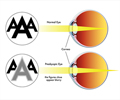A new model developed could make whole new avenues of macular degeneration research possible and has helped the team hone in on some possible drug targets for the disease.

‘Dysfunctional RPE cells can cause specific aspects of macular degeneration on their own without the help of other cells or components of the retina.’





This new model could make whole new avenues of macular degeneration research possible and has helped the team hone in on some possible drug targets for the disease."So far, there has not been a patient-derived model of macular degeneration," said Ruchira Singh, Ph.D., assistant professor of Ophthalmology in the Flaum Eye Institute at URMC and lead author of the study.
"It was not known if you can take cells from the human eye and make a cell model that displays the hallmarks of the disease."
Though macular diseases can vary widely, age-related and similar inherited macular degenerative diseases are all characterized by buildup of debris in the retina, the light sensing tissue in the back of the eye that is crucial for vision. These deposits, called drusen, are specifically found beneath a layer of retinal pigment epithelium (RPE) cells, which are known to be key players in macular degeneration.
For their new model, Singh’s team collected skin cells from patients with genetic forms of macular degeneration, re-programmed them to stem cells, and used the stem cells to create RPE cells. RPE cells derived from patients mimicked several characteristics of macular degeneration when aged in a dish, like producing the hallmark deposits.
Advertisement
Using this model, Singh’s group showed for the first time that dysfunctional RPE cells can cause specific aspects of macular degeneration on their own - without the help of other cells or components of the retina. This was true for cells derived from patients with three different genetic forms of macular degeneration, suggesting RPE cell dysfunction could be central to multiple forms of the disease.
Advertisement
In the study, the expression of genes that encode these proteins was elevated in RPE cells from all of the macular degeneration patients, suggesting they may also play a key role in multiple forms of the disease.
"Now we can actually identify and test a rational drug therapy in patients’ own cells," said Singh. "So far, this has not been possible, but now we can actually study macular diseases in parallel and identify what might be the central defect across macular diseases."
Singh believes this study will help move the field of macular degeneration research toward developing new drugs that target RPE cells, while providing a new and improved model to screen those drugs. Though this work is early, the team hopes it will lead to an effective treatment for macular degeneration in the future.
Source-Eurekalert











